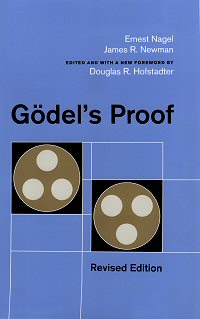Review: Gödel's Proof

- Title
- Gödel's Proof, Revised Edition
- Author
- Ernest Nagel and James R. Newman
- Publisher
- New York: New York University Press, 2001
- ISBN
- ISBN 0-8147-5816-9
Review Copyright © 2004 Garret Wilson — 5 July 2004 3:02pm
Starting in 1910, Bertrand Russell and Alfred North Whitehead released a three-volume set of works they called Principia Mathematica (xiii) which purported to show through a system of numeric proofs that arithmetic works. Starting with a set of axioms and following a limited set of defined transformations, Russell and Whitehead believed that they had showed that all of our adding and subtracting and the like really works for all positive numbers—as we know that surely it must.
Unfortunately, a young German named Kurt Gödel (1) came along and in 1931 published a paper which showed that there are certain arithmetic forumulas that must be true—we can show logically that they are—but cannot be proved by the system presented in Principia Mathematica. That's bad enough for Russell and Whitehead, but it gets worse. Gödel showed that no matter how many axioms are added to Principia Mathematica, it is still incomplete regarding some formulas. Worst of all, he showed that no such system based upon axiomatic reasoning can capture all things which we hold to be logically true.
This should not be taken for more than it is. This conclusion doesn't indicate, as the author points out, that there are truths that are accepted which require some mystical understanding. (112). It merely shows that axiomatic reasoning has certain limitations regarding proving certain true statements in number theory. Most interesting, perhaps, is that what it indicates regarding axiom-based computer-based systems: any computer system which seeks to understand the world based upon a finite set of facts and tranformation rules will be unable to come to some conclusions accessible by human reasoning. (111). This may call for the exploration of other learning methods—perhaps neural networks.
With an introduction and editing by Douglas R. Hofstadter, Gödel's Proof is a short overview of the original proof. It starts out with a background to the type of formal proofs used, and quickly delves deep into the specifics of Gödel's formulation. It's doubtful if one without a background in axiomatic proofs can fully access the complete proof in one read, but that's not such a disaster as the book is well written and the read is short. Russell's and Whitehead's enormous work isn't wrong—it's just necessarily incomplete. Gödel's Proof is an essential study and explanation of the transition of philosophy and mathematics to its linguistic centered approach today.
Copyright © 2004 Garret Wilson